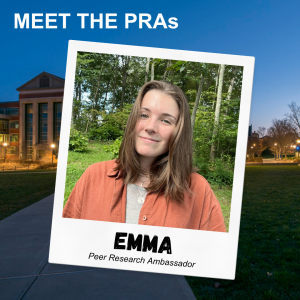 Meet Emma Beard ’24, an OUR Peer Research Ambassador (PRA) majoring in Molecular & Cell Biology and minoring in Physiology & Neurobiology.
Meet Emma Beard ’24, an OUR Peer Research Ambassador (PRA) majoring in Molecular & Cell Biology and minoring in Physiology & Neurobiology.
What is the focus of your research?
Broadly, my research focus is the Drosophila male germline. Previously, I looked at asymmetric stem cell division of male germline stem cells. During asymmetric stem cell division, newly synthesized histone H3 is inherited by the differentiating daughter cell, while preexisting H3 is inherited by the daughter stem cell. I worked on visualizing this asymmetric inheritance through live imaging of Drosophila testes, and also investigated the effects of perturbing asymmetric H3 inheritance. Currently, I am more focused on the later stages of Drosophila spermatogenesis. I am investigating the relationship between the expression of fertility factors on the Y chromosome and transposable elements in spermatocytes.
Why did you get involved in research?
I first became interested in research by hearing others talk about their research projects. I was really inspired by the passion people had for exploration in their field. I have also always loved lab classes, both in high school and college, so I thought the best way for me to get involved in research was in a lab. While I enjoy all aspects of research like reading papers and presenting my work, I will always be most fascinated by the techniques I get to use at the lab bench.
What advice would you give to aspiring student researchers?
It’s okay if it takes a little while to get started. If you already know you want to get involved in research, it can be frustrating when opportunities don’t work out and your ideal timeline is pushed back. Both because of COVID-19 and lab positions that never quite made it from email to reality, I didn’t get started in research until the summer after my sophomore year. I knew in high school that research was something I wanted to do in college, so having it constantly pushed off was difficult. However, it also helped me find a great lab. If I had gotten started any earlier, I wouldn’t have taken any cell biology classes yet, wouldn’t have discovered how cool that side of the molecular and cell biology major is, and wouldn’t have applied to work with my current mentor in a cell biology lab. Sometimes, waiting is worthwhile.
What do you enjoy the most about participating in research?
I love how what I learn doing research relates to my classes and vice versa. It’s really cool to be in class or doing homework and see either a technique I’ve used before or a connection to my project. I definitely get ideas for my research project from my classes, as well.
What are your plans after graduation? How has involvement in research influenced your plans?
I am planning to pursue a PhD in biomedical sciences. While I knew I was interested in research, I wasn’t sure if it was something I wanted to fully commit to after graduation until I got involved with research at UConn. It helped confirm for me that research is something I would want to do full-time. Undergraduate research also helped prepare me for some of the unexpected parts of working in a lab. I had no idea so much of science research isn’t just doing experiments, and I was shocked to spend as much time at my desk as the lab bench. Getting a better understanding of what research actually is has been really helpful for preparing me for the future.
Click here for more information on Emma and other OUR Peer Research Ambassadors.